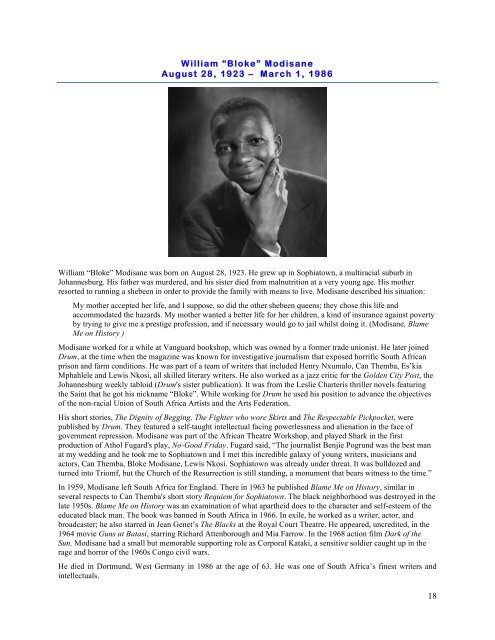Come Back Africa Press Kit - Get a Free Blog
Come Back Africa Press Kit - Get a Free Blog
Come Back Africa Press Kit - Get a Free Blog
Create successful ePaper yourself
Turn your PDF publications into a flip-book with our unique Google optimized e-Paper software.
William “Bloke” Modisane<br />
August 28, 1923 – March 1, 1986<br />
William “Bloke” Modisane was born on August 28, 1923. He grew up in Sophiatown, a multiracial suburb in<br />
Johannesburg. His father was murdered, and his sister died from malnutrition at a very young age. His mother<br />
resorted to running a shebeen in order to provide the family with means to live. Modisane described his situation:<br />
My mother accepted her life, and I suppose, so did the other shebeen queens; they chose this life and<br />
accommodated the hazards. My mother wanted a better life for her children, a kind of insurance against poverty<br />
by trying to give me a prestige profession, and if necessary would go to jail whilst doing it. (Modisane, Blame<br />
Me on History )<br />
Modisane worked for a while at Vanguard bookshop, which was owned by a former trade unionist. He later joined<br />
Drum, at the time when the magazine was known for investigative journalism that exposed horrific South <strong>Africa</strong>n<br />
prison and farm conditions. He was part of a team of writers that included Henry Nxumalo, Can Themba, Es’kia<br />
Mphahlele and Lewis Nkosi, all skilled literary writers. He also worked as a jazz critic for the Golden City Post, the<br />
Johannesburg weekly tabloid (Drum's sister publication). It was from the Leslie Charteris thriller novels featuring<br />
the Saint that he got his nickname “Bloke”. While working for Drum he used his position to advance the objectives<br />
of the non-racial Union of South <strong>Africa</strong> Artists and the Arts Federation.<br />
His short stories, The Dignity of Begging, The Fighter who wore Skirts and The Respectable Pickpocket, were<br />
published by Drum. They featured a self-taught intellectual facing powerlessness and alienation in the face of<br />
government repression. Modisane was part of the <strong>Africa</strong>n Theatre Workshop, and played Shark in the first<br />
production of Athol Fugard's play, No-Good Friday. Fugard said, “The journalist Benjie Pogrund was the best man<br />
at my wedding and he took me to Sophiatown and I met this incredible galaxy of young writers, musicians and<br />
actors, Can Themba, Bloke Modisane, Lewis Nkosi. Sophiatown was already under threat. It was bulldozed and<br />
turned into Triomf, but the Church of the Resurrection is still standing, a monument that bears witness to the time.”<br />
In 1959, Modisane left South <strong>Africa</strong> for England. There in 1963 he published Blame Me on History, similar in<br />
several respects to Can Themba's short story Requiem for Sophiatown. The black neighborhood was destroyed in the<br />
late 1950s. Blame Me on History was an examination of what apartheid does to the character and self-esteem of the<br />
educated black man. The book was banned in South <strong>Africa</strong> in 1966. In exile, he worked as a writer, actor, and<br />
broadcaster; he also starred in Jean Genet’s The Blacks at the Royal Court Theatre. He appeared, uncredited, in the<br />
1964 movie Guns at Batasi, starring Richard Attenborough and Mia Farrow. In the 1968 action film Dark of the<br />
Sun, Modisane had a small but memorable supporting role as Corporal Kataki, a sensitive soldier caught up in the<br />
rage and horror of the 1960s Congo civil wars.<br />
He died in Dortmund, West Germany in 1986 at the age of 63. He was one of South <strong>Africa</strong>’s finest writers and<br />
intellectuals.<br />
18


